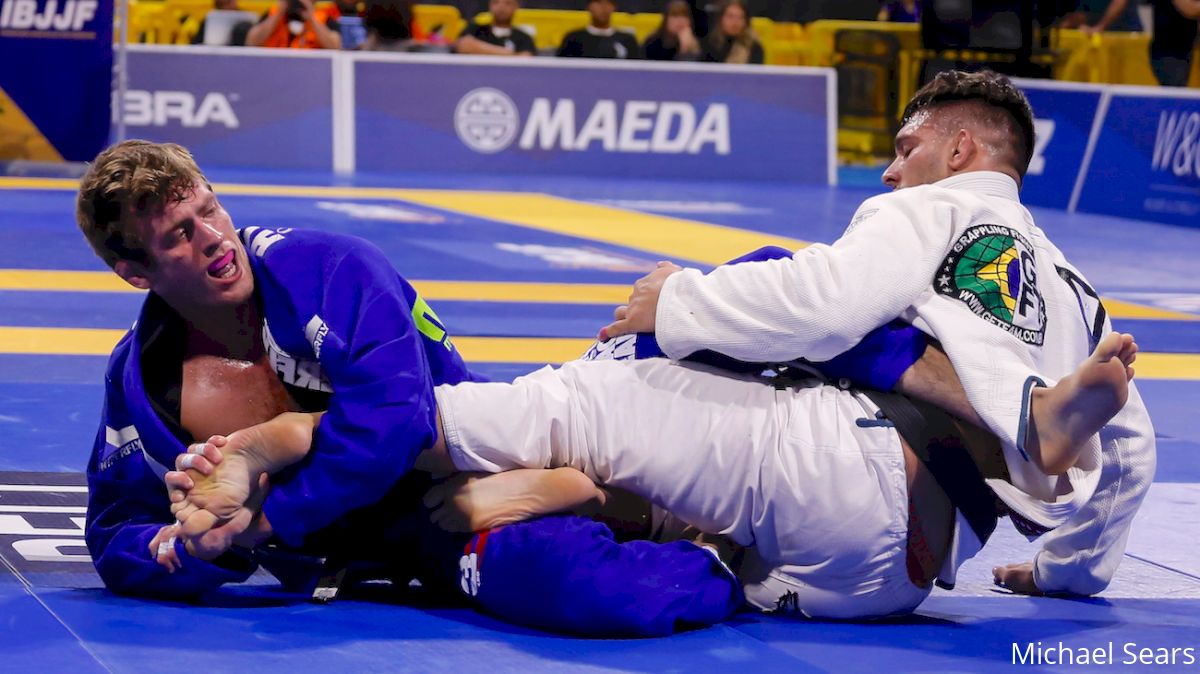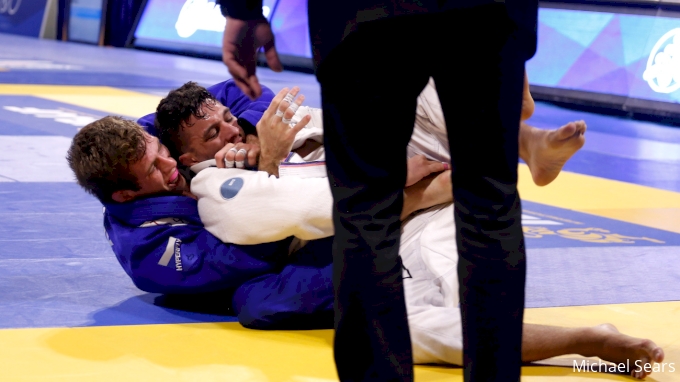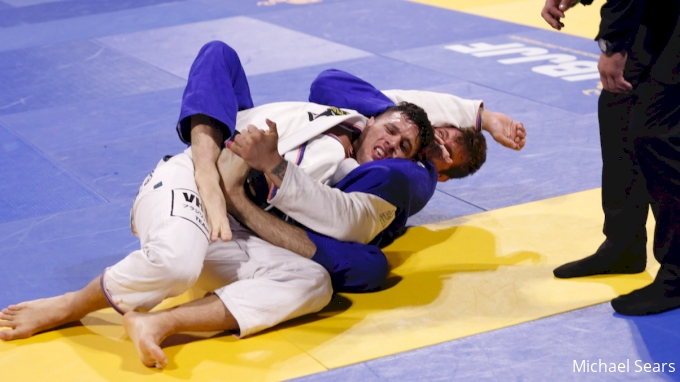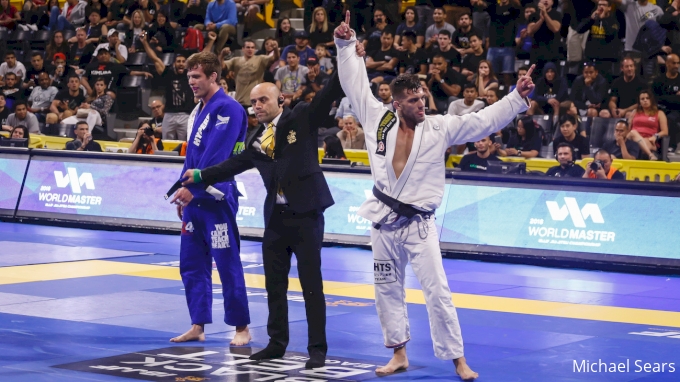Is There An Anti-American, Pro-Brazilian Bias in Jiu-Jitsu? Drysdale Speaks
Is There An Anti-American, Pro-Brazilian Bias in Jiu-Jitsu? Drysdale Speaks
The match between Keenan Cornelius and Patrick Gaudio reignited an old debate about the IBJJF and their alleged biases towards Brazilians.

Outside of staying on top of new technical developments and tournament results, I’m not one to spend much time on the internet or participating in social media discussions about what’s going on in BJJ.
However, I did notice that the recent heavyweight semifinal between Keenan Cornelius and Patrick Gaudio reignited an old debate about the IBJJF and their alleged biases towards Brazilians.
My entire grappling experience was split between Brazil (where most of my competition experience stems from) and the U.S. (where most of my coaching career took place). I believe it is fair to say I am somewhat acquainted with this discussion and I hope to tackle it as fairly and as pragmatically as possible.

I’ve competed innumerable times under IBJJF rules and coached extensively. I participated in referee courses and even had the unpleasant opportunity to referee under their rules (in the distant past). This has all brought me some insight as to their failings as well as their improvement as an organization over the last two decades.
As mentioned, most of my experience as a competitor took place in Brazil where I immersed myself in their competition circuit for years. Needless to say, I have had many of the same negative experiences many other competitors experience today.
A Foot in Both Camps
My career as a grappler– along with being an American-Brazilian– has given me a vantage point of observing not only the evolution of IBJJF as an organization in both countries, but of a cultural clash I have been all too familiar with since my childhood and that, in fact, long precedes my initiation in BJJ. With that out of the way, I want to give my opinion on the current state of BJJ and the organization that fronts it.
It is difficult for a younger generation to grasp how much IBJJF has improved over the years. I remember well the selection process of referees and how unfiltered it was; how semifinals and finals would only have one referee (making the competitor more likely to be subjected to injustices); when referee courses were few and far between; when the criteria were far less objective than they are now (despite much still being left to the referee’s interpretation); how uniforms followed no code and the “jeitinho brasileiro”* was almost always there, quietly inserted in the landscape of the BJJ scene.
*Which I will loosely translate as the “Brazilian little-way.” Which refers to the ability to improvise on the spot and bending rules. One of the most self-damaging features of Brazilian society and culture in my view.
Improvements aside, much remains to be changed in my view:
• More objective criteria (particularly when it comes to attacks involving the legs)
• Penalizing stalling for bottom player with the same consistency as the top player is (having the leg wrapped up with the lapel from the “fifty-fifty” position comes to mind)
• Penalizing guard-pulling (to reinforce take-down discipline)
• Rewarding near submissions with points rather than advantages
• Shorter matches; etc.
Frankly, I feel I can make a better case against the current rules than almost any other critics. With that said, from my experience at least, the federations are open and willing to listen and adhere to coherent and thoughtful arguments in order to better their rules. Facebook rants notwithstanding.
The Rules We Want Vs The Rules We Have
I have often found it difficult to argue with them for changes that, at least in principle, would be easy to make. Nonetheless, the reality of altering rules is far from smooth and in practice the solution of one problem often creates two or three other problems, sometimes greater ones than the ones it proposed to solve.
I was exposed to this when I made a suggestion during an IBJJF meeting and was subsequently handed a piece of paper and a pen in order to write it down for their rule-book, which immediately exposed my lack of thought in making the suggestion, since the latter clearly created a number of other unforeseen problems. A conundrum all too familiar to anyone who, in a serious manner, has ever attempted to create any form of legislation.

Whether The Bias Really Exists
In regards to the more immediate topic that gives this article its title, I will give my honest opinion whether or not referees are purposely cheating non-Brazilians.
I’ll begin by giving my personal opinion that the Brazilian people are far from the nationalistic type, perhaps to the countries own economic, political and social detriment. [For an in-depth and informed understanding of the formation of Brazil as nation and as a people, I recommend the classic “The Brazilian People” (O Povo Brasileiro) by the late Anthropologist Darcy Ribeiro., available in English.]
During the seven to eight years I competed and trained in Brazil (at one point competing in thirty-one divisions over the course of one year alone) I felt the heavy weight of the “referee’s interpreting-hand” on my life and ambition. I honestly don’t know of anyone not born in Brazil who can say they have competed or experienced jiu-jitsu in Brazil more than myself.
On many occasions I believe the referee erred in my fights and caused me to lose– which, to my later regret, I blamed on the referee rather than on my own inability to win decisively. The errors were mostly due to their own ineptitude as a referee, often due to an honest mistake, and– perhaps at times to a lesser extent– due to the the referee being somehow affiliated with my opponent, be that a filial, team or friend-based connection. But not once did I ever feel cheated because I was born in the United States.
It Goes Both Ways (Or Does It?)
What is so ironic about this discussion, to me at least, is that in my work as an MMA coach I often find myself on the other end of the spectrum explaining myself to my Brazilian friends who fervently believe that the UFC and American judges working for U.S. based commissions are equally biased against Brazilians.
I vividly recall one occasion a few years back during a brief visit to Brazil being invited to a typical Brazilian Sunday afternoon “churrasco” [barbeque] with a number of my closest friends. The conversation quickly became about the UFC giving title-shot preference to English-speaking athletes and State commission judging being biased in favor of Americans. When I offered my differing opinion (in the case of judging, not of biases towards title-shots) my disagreement was met with laughter and ridicule by my friends. In fact, they considered the notion to be so outlandish that it did not even merit discussion.
Confirmation bias is undoubtedly a human-universal to which we all fall victim during the course of our lives. And this is my point: we are constantly seeking out proof that confirms our thesis, rather than doing the opposite. The more honest and serious approach is to search for evidence that disproves our thesis in order to accurately verify its credibility.
I will add that if there is any bias lurking around the combat world in which we gravitate, it is of a financial nature and not of a nationalistic one. For the UFC to favor English-speaking contenders for the crown makes perfect financial sense. Conversely, it makes no particular sense for IBJJF to favor Brazilians as it constitutes a much smaller percentage of their market.
How The IBJJF Are Improving
It goes without saying that IBJJF is a private institution and, much like any business, it is aimed at profiting. However, having an eye for profits while doing what they consider to be what is best for the sport, are not necessarily mutually exclusive.
In a recent past, I wrote an article in which I made some criticism of IBJJF, one of these critiques aimed at IBJJF being largely money-oriented. This is something to which, admittedly, they have improved tremendously over the years by giving cash prizes to top competitors, something which was unthinkable twenty years ago.
My article prompted a friendly discussion with a senior IBJJF representative, who confronted me in regards to my accusation of IBJJF being an exclusively profit-oriented business. His argument went something along these lines: If IBJJF had no concern for the betterment of the sport and only sought out profits, then they would have adhered to the long-time suggestion that myself and others have made to shorten the time of all matches. The shorter matches would warrant an increase in the number of competitors allowed to register (given the capacity limit of many of their competitions) and significantly increase their profits. An argument that prompted my immediate silence as well providing me with food for thought as to my own biases.
Advantages In The Keenan-Gaudio Match
I like Gaudio, he’s a hungry upcoming star with tons of potential. But to be frank I rooted for Keenan the whole time. From the first time I saw him compete as a purple belt I always believed he was going to be the next big thing in this sport. Furthermore, I understand his frustration and any competitor can empathize with it. With that said, a few comments…

First, it was a split decision based on Gaudio’s leglock advantage as well as on the decision to give Gaudio the win (which immediately eliminates any accusations of a conspiracy). Secondly, I would not have awarded that footlock advantage to Gaudio at the very end, but then again, I am not sure I would have awarded Keenan the advantage for an earlier toe-hold he had Gaudio in either.
The criteria for submissions advantages is based on the danger of being in danger from a near-submission, not merely being held in one. In my view, both advantages fall well within the “gray-area” of referee interpretation. A problem to which the only solution would be to eliminate advantages altogether, which of course, comes along with a series of other foreseeable problems.
Taking Responsibility
One of the primary lessons I attempt to teach my students– with relative degree of success– is to always blame themselves for their losses.
We are responsible for our immediate actions and what we can immediately affect. Hence, if one cannot be responsible for the referee’s mistakes, assuming they did indeed occur, then there is no point in spending your energy on what you can’t change, since you are not responsible for it.
For every mistake the referees make (undoubtedly they make many), the honest competitor will quickly see that he made countless others. Ultimately, the referee always errs less than we do.